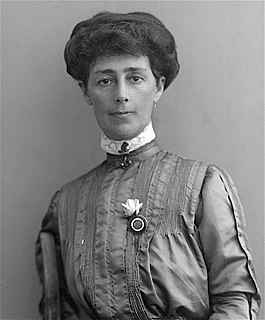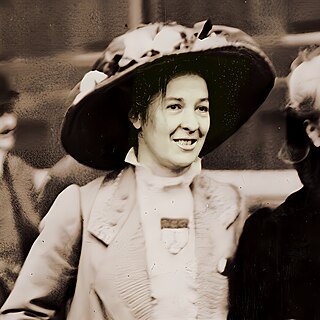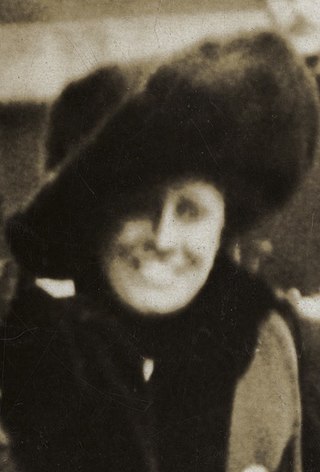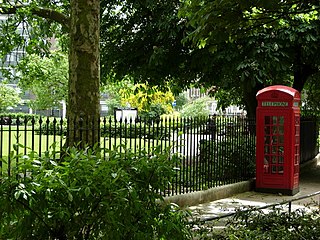
Dame Millicent Garrett Fawcett was a British intellectual, political leader, activist, and writer. She is primarily known for her work as a campaigner for women's suffrage.

Vida Jane Mary Goldstein was an Australian suffragette and social reformer. She was one of four female candidates at the 1903 federal election, the first at which women were eligible to stand.

The Women's Freedom League was an organisation in the United Kingdom which campaigned for women's suffrage and sexual equality.
Rosa Frances Emily Swiney, née Biggs, was an early British feminist, writer, and theosophist. She was born in Poona, India, but spent most of her childhood in Ireland. In 1871 she married Major John Swiney (1832–1918), and devoted herself to becoming a full-time wife and mother. Swiney relocated to Cheltenham, Gloucestershire in 1877, a place she described later in her life as "the town of no ideals", where her husband joined her ten years later.

Teresa Billington-Greig was a British suffragette who helped create the Women's Freedom League. She left another suffrage organisation - the WSPU - as she considered the leadership too autocratic.

Edith How-Martyn, née How was a British suffragette and a member of the Women's Social and Political Union (WSPU). She was arrested in 1906 for attempting to make a speech in the House of Commons. This was one of the first acts of suffragette militancy. She met Margaret Sanger in 1915 and they created a conference in Geneva. How-Martyn toured India talking about birth control. She had no children and died in Australia.

Margaret Wynne Nevinson was a British suffrage campaigner.

Women's suffrage in the United Kingdom was a movement to fight for women's right to vote. It finally succeeded through two laws in 1918 and 1928. It became a national movement in the Victorian era. Women were not explicitly banned from voting in Great Britain until the 1832 Reform Act and the 1835 Municipal Corporations Act. In 1872 the fight for women's suffrage became a national movement with the formation of the National Society for Women's Suffrage and later the more influential National Union of Women's Suffrage Societies (NUWSS). As well as in England, women's suffrage movements in Wales and other parts of the United Kingdom gained momentum. The movements shifted sentiments in favour of woman suffrage by 1906. It was at this point that the militant campaign began with the formation of the Women's Social and Political Union (WSPU).

Mary Reid Macarthur was a British suffragist and Scottish trades unionist. She was the general secretary of the Women's Trade Union League and was involved in the formation of the National Federation of Women Workers and National Anti-Sweating League. In 1910 Mary led the women chain makers of Cradley Heath to victory in their fight for a minimum wage and led a strike to force employers to implement the rise.
Constance Antonina (Nina) Boyle was a British journalist, campaigner for women's suffrage and women's rights, charity and welfare worker, and novelist. She was one of the pioneers of the women's police service in Britain; in April, 1918, she was the first woman to be nominated to stand for election to the House of Commons, which paved the way for other female candidates in the general election held in December of that year.

Emma Jane Catherine Cobden, known as Jane Cobden, was a British Liberal politician who was active in many radical causes. A daughter of the Victorian reformer and statesman Richard Cobden, she was an early proponent of women's rights, and in 1889 was one of two women elected to the inaugural London County Council. Her election was controversial; legal challenges to her eligibility hampered and eventually prevented her from serving as a councillor.
Marion Coates Hansen was an English feminist and women's suffrage campaigner, an early member of the militant Women's Social and Political Union (WSPU) and a founder member of the Women's Freedom League (WFL) in 1907. She is generally credited with having influenced George Lansbury, the Labour politician and future party leader, to take up the cause of votes for women when she acted as his agent in the general election campaign of 1906. Lansbury became one of the strongest advocates for the women's cause in the pre-1914 era.

Flora Merrifield was a British suffragist who campaigned for women’s right to vote.
Kate Harvey was an English suffragist, physiotherapist, and charity worker. Profoundly deaf and widowed at a young age, she operated a home for women and children, and then later for disabled children. She participated in the Women's Tax Resistance League and was jailed for her refusal to pay tax if she were not allowed the right to vote. She was the first person imprisoned for failure to pay a tax under the Insurance Act.

Alice Schofield or Alice Schofield Coates was a British suffragette and politician. She campaigned for women to have the vote and later campaigned for the legislation to give women rights to equal pay.

Emma Sproson, was a suffragette, then a suffragist, socialist, politician and women's rights activist. Active in the Midlands and from a working class background, she became Wolverhampton's first female councillor, gaining the nickname "Red Emma" in the process.




















